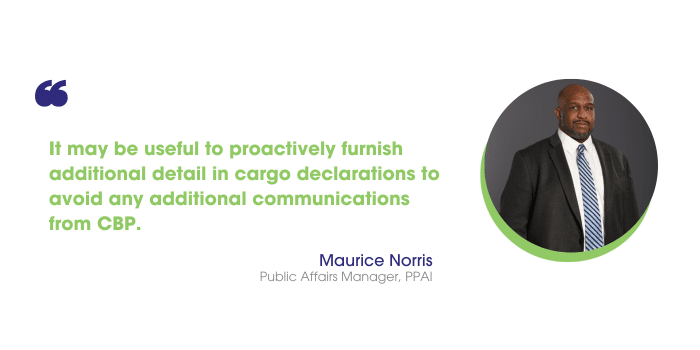If you don’t want to run afoul of U.S. Customs and Border Protection (CBP), make sure the description of the promotional products you’re importing is clear and precise.
As of April 1, CBP has begun notifying importers when they have “vague, noncompliant” cargo descriptions.
- Carriers and other parties electing to file electronic cargo information data to CBP are required to provide a precise description of the cargo.
Specifically, CBP is aiming to address descriptions including, but not limited to, “gift,” “daily necessities,” “accessories,” “parts” and “consolidated,” according to a recent Cargo Systems Messaging Service bulletin.

With increased scrutiny surrounding enforcement of the Uyghur Forced Labor Prevention Act (UFLPA) and other timely policies, CBP is requiring certain importers to be more precise with how they describe their shipments, says Maurice Norris, PPAI’s public affairs manager.
- Signed into law in December 2021, the UFLPA bans all imports from China’s Xinjiang province under the presumption that all goods from the area are produced with forced labor and imposes sanctions on foreign individuals responsible for forced labor in the region.
“The recent bulletin provides an inexhaustive list of examples and circumstances regarding indefinite representations that CBP may determine aren’t compliant with current declaration requirements,” Norris says. “It may be useful to proactively furnish additional detail in cargo declarations to avoid any additional communications from CBP.”
What To Expect
In most cases, CBP will send messages via ACE Cargo Release – the automated system through which the trade community reports imports and exports and the government determines admissibility – after release of the cargo.
Below is an example of a cargo message for a de minimis shipment transmitted with a vague cargo description:
- ecommerce@cbp.dhs.gov Cargo description unacceptably vague. A precise description is required.
In shipping jargon, de minimis is the minimum value defined by a country that’s required to apply customs duty and tax rates on imported items.
- In the U.S., the current de minimis threshold is $800, which means any imports at that rate or lower are free from duties and taxes.
Brokers and importers are expected to process these messages and work to correct the issue with the shipper and bill of lading issuer for compliance on future shipments, according to CBP.
Meanwhile, brokers and freight forwarders who self-file house bills – receipts sent to shippers confirming brokers and freight forwarders have received the item – are held to the same standard as carriers and are expected to screen data for compliance with cargo declaration regulations.
- The entry filer is expected to review the cargo messages for compliance when concerns are identified.
- If the entry filer and bill of lading filer are the same, corrective action is expected immediately.
- If CBP identifies any enforcement concerns, it may take additional actions.


